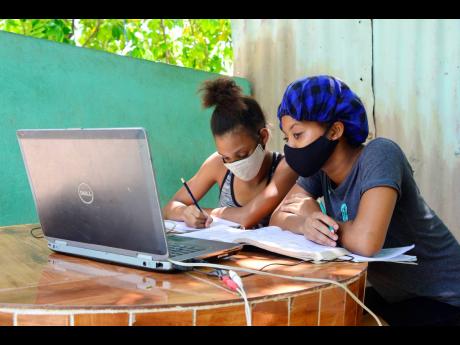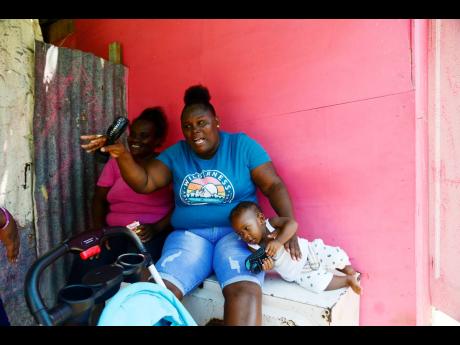Flat-footed and confused - COVID pressure intensifies for parents with classes set to resume next week
Parents in some of the Corporate Area’s toughest communities say they are in a tailspin as they hunt electronic devices and Internet for their children before the official start of the new school year on October 5.
Still, others in five hard-pressed communities visited by The Sunday Gleaner last week were not so perturbed. School supplies were the last things on their minds after COVID-19 left them jobless and their nightly dinners become more elusive.
“Me nuh buy nothing ‘cause me never plan to send them nowhere,” said Tameka Boors, a mother of three and resident of ‘Back Bush’, a tough section of Mountain View Avenue in Kingston.
“Me a deal wid ‘tan a yaad’ school. When my babyfather gets paid, we put down the money and I buy food ‘cause my pickney dem craven,” she continued.
“The only thing dem get is three tablets – $14,000 for each – and that is only because my babyfather’s sister send the money. Otherwise, me never woulda buy it,” stressed Boors.
Unknown to her is that her child is among less than 50 per cent of students at nearby Mountain View Primary School with access to IT devices and Internet connection – critical resources as classes have moved online in wake of the pandemic. Also, while her household has three tablets, some residents in the nearby informal ‘Bowerbank’ in east Kingston share one tablet between three homes.
The Government last week said it will spend $1.7 billion to provide tablets and laptops for primary- and secondary-school students, mainly those on the state welfare PATH programme.
Last week, persons were more concerned about providing the resources for their children than they were sceptical about the trade-offs between online and face-to-face interaction.
COLLECTIVE INTERNET
In Back Bush, like in many impoverished Kingston communities, Internet services are paid for collectively by residents. So a $5,000 Internet bill is sometimes split between five persons; and when those systems are bogged down, parents and their children depend on cell data services – another niggling expense and inconvenience.
Parents like Nickey Morris, a mother of six and Bowerbank resident, said their children will have to attend classes on her personal cell phone as none of them has access to an electronic device. On Tuesday, her three youngest children huddled among a group to watch a video on a tablet in the community.
“My daughter doesn’t have a laptop and she needs one. Right now, she gone to her friend’s yard to use hers, and I don’t like that because you know that can lead to many things,” lamented Winsome Brown, whose daughter, a student of Camperdown High, is slated to sit nine Caribbean Secondary Education Certificate exams next year.
“Sometimes she leaves out here early in the morning and come home late in the evening, and is pure little shooting thing going on in the place. That makes me ‘fraid for her,” continued Brown.
As Brown spoke, several mothers filed out from behind wooden fences, some with two or three children in tow. Most said they were in a quandary about back-to-school expenses. Others wanted devices for their children, while some asked for food.
LAY-OFFS
Many, like Monique Harrison – who was denied an opportunity to work in the tourism sector earlier this year due to pandemic – were hairdressers, bartenders, or wholesale workers, and have been laid off as the economy tightens under the tethers of the outbreak.
Shamar Esson was laid off from her maintenance job at the Caribbean Maritime University and, since then, has taken out a loan to start a small clothing business outside her home on Wild Street in Franklyn Town.
Not much money comes in each day, she said, but the humble stall keeps food on the table for her and her three children.
Inside the tenement yard, Marlone Clachar was in a tizzy. Unemployed, he spent much of the afternoon bemoaning his struggle to find $190,000 in university tuition expenses for his daughter. So far, he has only been able to come up with $28,000 – and that was no easy feat, he said.
Joblessness was also the main concern for residents of Lissant Road in Kingston, where parents were equally confused and concerned about the Government’s new school orders.
George Miller is among the few adults in the area with a Wi-Fi hotspot, and he has grown accustomed to neighbourhood children milling about his yard in search of a signal.
A similar sight can be had outside the St Michael’s Primary School on Tower Street in central Kingston, which served as a Wi-Fi oasis for children in the area almost every evening.
But while many parents bemoan the expenses associated with finding Internet access and devices for their children, Latoya Lovemore, a resident of Johns Street in Allman Town, said parents will just have to do what it takes to ensure that their children gain access to online classes.
“Just as dem put credit pon dem cellular phone to go online and talk all kinds of foolishness, them must make the sacrifice to buy credit so that dem children can do online class,” she argued.


